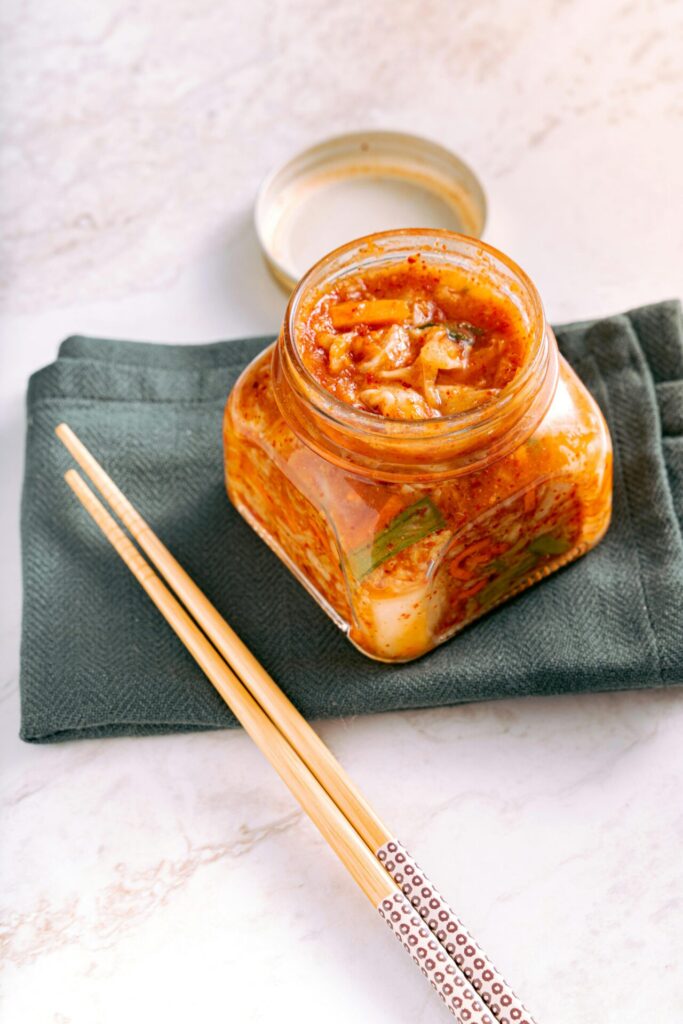You know what’s crazy? I spent years popping antacids like candy and just accepting that bloating and discomfort were my new normal. Then I stumbled upon a mind-blowing fact: a whopping 60-70% of our immune system is actually housed in our gut!
That discovery sent me down a rabbit hole of research that completely changed my approach to eating. As someone who’s always been a bit of a science nerd (and now, admittedly, a gut health enthusiast), I’ve learned that the foods we eat can either be our gut’s best friend or its worst enemy. The difference is life-changing!
In this article, I’m going to share the 15 absolute best anti-inflammatory foods that can transform your gut health. But don’t worry – this isn’t just another list of “superfoods” that’ll collect dust in your pantry. I’ve personally tested these foods, dug into the latest research (as recent as 2024), and I’m including practical tips on how to actually enjoy them. Because let’s be honest – if it doesn’t taste good, we’re not going to eat it, right?
What Makes a Food Anti-Inflammatory?
Before we dive into our list, let’s get one thing straight – inflammation isn’t always the bad guy. I remember when my nutritionist first explained this to me, and it kind of blew my mind! Think of inflammation as your body’s personal security team. When there’s a threat (like an injury or infection), inflammation rushes in like a first responder. That’s acute inflammation, and it’s actually super helpful.
The problem? Sometimes this security team gets a little overzealous and doesn’t know when to clock out. That’s chronic inflammation, and it’s like having an overprotective bodyguard who sees threats everywhere – even when they’re not real. This type of inflammation can wreak havoc on your gut and, trust me, I’ve been there!
Here’s what makes certain foods anti-inflammatory powerhouses:
- Polyphenols: These are like the gut’s peacekeepers. Found in colorful fruits and veggies, they help calm things down when inflammation gets out of hand.
- Omega-3 fatty acids: Think of these as the gut’s maintenance crew, helping to repair and keep things running smoothly.
- Fiber: This is basically a feast for your good gut bacteria. When they’re happy, they produce compounds that fight inflammation. Who knew bacteria could be such good allies?
I used to think eating for gut health meant bland, boring meals. The foods we’re about to dive into are not only scientifically proven to fight inflammation – they’re actually delicious.
Top 15 Anti-Inflammatory Foods for Gut Health
1. Fatty Fish (Salmon, Mackerel, Sardines)
Here’s the thing: fatty fish are absolute superstars when it comes to fighting gut inflammation. They’re packed with omega-3 fatty acids, particularly EPA and DHA, which are like a soothing balm for your inflamed gut.
My game-changer? Learning how to prepare fish properly! Trust me, there’s a world of difference between a dried-out salmon fillet and one that’s perfectly cooked. Here’s what I’ve learned:
- Aim for 2-3 servings of fatty fish per week
- Start with milder options like salmon if you’re new to fish
- Try this foolproof cooking method: 400°F oven, 12-15 minutes, with just olive oil, lemon, and herbs
Pro tip: If you’re worried about mercury, wild-caught salmon and sardines are your safest bets. And here’s a little secret – canned sardines mashed with avocado make an amazing sandwich filling. Don’t knock it till you’ve tried it!
2. Leafy Greens (Spinach, Kale, Collards)
I can practically hear some of you groaning – “Not more kale!” But stick with me here. Leafy greens are like the Swiss Army knife of gut health. They’re packed with fiber (your gut bacteria’s favorite food), antioxidants, and compounds that help maintain the integrity of your gut lining.
When I first started increasing my greens intake, I made the classic mistake of going overboard. Let me save you some, um, discomfort – start slow! Here’s what I’ve learned works best:
- Begin with milder greens like spinach before tackling the more robust ones
- Massage your kale! Sounds weird, but it breaks down the tough fibers and makes it much more palatable
- Always pair your greens with a healthy fat – it helps you absorb the nutrients better
My favorite hack? I keep frozen spinach cubes in my freezer. They’re perfect for tossing into smoothies, and you can’t even taste them.
3. Fermented Foods (Kimchi, Sauerkraut)

Let’s talk about the food group that literally changed my life – fermented foods! I know what you might be thinking, because I thought it too: “Isn’t that just fancy rotting?” Well, kind of, but in the best possible way!
My journey with fermented foods started with a tiny spoonful of sauerkraut. I wasn’t convinced at first (the smell was… interesting), but after consistently incorporating these probiotic powerhouses into my diet, the difference in my gut health was night and day.
Here’s what makes fermented foods so special:
- They’re packed with probiotics – beneficial bacteria that help fight inflammation
- The fermentation process makes nutrients more bioavailable
- They can help break down hard-to-digest compounds
A word of caution from my personal experience: start small! I got a bit too excited and ate a whole bowl of kimchi my first time. Let’s just say my stomach was not impressed. Start with 1-2 tablespoons daily and work your way up.
My top picks for beginners:
- Water kefir – it’s like a natural soda!
- Kombucha – look for brands with less than 5g of sugar
- Plain yogurt – go for full-fat, it’s more satisfying and better for your gut
4. Turmeric
If there was a superhero of the spice world, turmeric would be it! I first discovered its power when I was dealing with some pretty intense gut issues back in my 30s. A friend suggested adding turmeric to my diet, and honestly, I was skeptical. I mean, how much could a simple spice really do?
Turns out, quite a lot! The active compound in turmeric, curcumin, is like a firefighter for inflammation in your gut. But here’s the kicker – it’s not easily absorbed on its own. Through trial and error (and lots of yellow-stained countertops), I’ve learned some tricks:
- Always pair turmeric with black pepper – it increases absorption by up to 2000%
- Combine it with a healthy fat (I love coconut oil)
- Aim for about 1/2 to 1 teaspoon daily
My favorite way to use turmeric? Golden milk! Here’s my tried-and-true recipe: 1 cup plant-based milk 1/2 tsp turmeric 1/4 tsp cinnamon Pinch of black pepper 1 tsp honey (optional)
Heat it all up, and you’ve got a cozy, gut-healing drink!
5. Berries (Blueberries, Strawberries, Raspberries)
Berries are like little antioxidant bombs, and they’ve become my go-to snack for gut health.
What makes berries so special for gut health:
- They’re rich in polyphenols, which feed your good gut bacteria
- The fiber content helps maintain regular digestion
- Their antioxidants combat oxidative stress in the gut
A cool tip I learned from a nutritionist: frozen berries actually retain their antioxidant properties better than fresh ones that have been sitting around. Plus, they’re usually cheaper! I always keep a bag in my freezer for smoothies or as a cool snack.
My berry-licious gut health routine:
- Morning: 1/2 cup mixed berries with yogurt
- Snack: Frozen blueberries (they taste like little sorbet bites!)
- Smoothies: A handful of frozen berries for antioxidant power
How to Incorporate These Foods Into Your Diet
When I first started my gut health journey, I made the classic mistake of trying to change everything overnight. It didn’t work. Instead, here’s the gradual approach that actually did work for me:
- Start with one meal I began by transforming just my breakfast. My go-to became a gut-healing smoothie:
- 1 cup coconut water
- 1/2 cup mixed berries
- 1 handful spinach
- 1 tablespoon chia seeds
- 1 scoop collagen powder (optional)
- The “add, don’t subtract” method Instead of focusing on what to eliminate, I started adding anti-inflammatory foods to my existing meals.
- Sprinkle turmeric on roasted vegetables
- Add a spoonful of sauerkraut to your lunch plate
- Swap regular tea for ginger tea in the afternoon
- Prep ahead Sunday is my prep day. Here’s my routine:
- Make a big batch of roasted vegetables
- Prepare jars of overnight oats with berries
- Brew a batch of anti-inflammatory tea (ginger, turmeric, and green tea)
Potential Side Effects and Considerations
My enthusiasm for gut health once had me eating so much fiber that I thought my stomach was going to explode! Here’s what you need to know:
- Start slow
- If you’re new to fermented foods, begin with just 1 tablespoon daily
- Gradually increase fiber intake over several weeks
- Listen to your body – some gas is normal, severe bloating isn’t
- Common pitfalls to avoid:
- Don’t overdo it with turmeric – it can cause digestive issues in large amounts
- Be cautious with fatty fish if you’re on blood thinners
- Some people may be sensitive to histamines in fermented foods
When to see a doctor:
- If you experience severe bloating or pain
- If you have a diagnosed gut condition, consult before making major diet changes
- If you’re on medications, check for potential interactions
Remember, we’re all different. What worked amazingly for me might need some tweaking for you. It’s about finding your personal gut health sweet spot!







